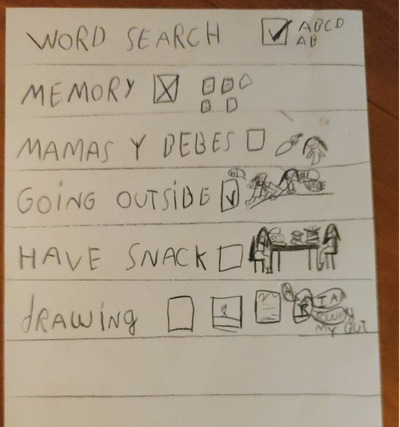Alternatives to help children reduce the amount of screen time
- Written by Monica Amores
- Published on May 27, 2023

20 years ago, experts told us that introducing technological devices as early as possible would only bring benefits to the children, by making them more intelligent, with a better language development and more academically skilful, among other ‘good stuff’.
Yes, technology has certainly improved our lives, but there are also negative consequences of screen time we cannot ignore.
Some facts are:
- Small children being pushed in their prams, while watching a smartphone or a tablet and not learning about the world around them.
- Children being exposed to long hours of background television since a very young age, even though no one is watching, just to fill the void of silence and provide additional stimulation.
- Children eating in front of screens, either at home or at restaurants as a way of ‘keeping them quiet’.
- Children having their sleep interrupted because of watching screens just before bedtime.
Today, scientific data is contradicting what the experts told us two decades ago:
- The American Academy of Paediatrics recommends not to use any sort of screens before the age of two;
- The World’s Health Organisation has included the video games as an addiction;
- In many countries there already exist ‘Screen Detox Centres’;
- Studies from the John’s Hopkins All Children Hospital show that from toddlerhood to early school age, children are at least watching two hours of TV per day.
- Previous analysis says that screen time has been linked to children being less likely to pay attention during playtime, reduced cognitive abilities, and lower-quality interactions between parents and their children.
- New research shows that constant exposure to electronics increases the likelihood of depression, anxiety and suicidal thoughts.
These are not just highly credible conclusions that we can easily access to, but a sad reality that we could confirm with the restrictions from the lockdowns of 2020-2021, that left a worrying increment in the mental health repercussions of children and adolescents: isolation from their friends, less contact with nature, loneliness, increased screen time, depression, anxiety, irritability, and sedentary behaviours, among others.
we know that children who spend too much time in front of electronic devices may not benefit from the development of healthy social skills, and they may struggle to make ‘real life’ friends. Also, that excessive screen time can also overstimulate the child’s brain, which can be a contributing factor to ADHD.
Paradoxically, most schools around the world have implemented the use of technology to learn the subjects; children are encouraged to log their homework on the school’s platform; they have stopped using books to research for school projects but now they use search engines; they have replaced handwriting for the keyboard; and during Covid times, they were forced to spend at least five hours per day in online classrooms.
The internet is plagued with websites offering their services to teach young children “How to make their own video games”, “How to learn to code / program”, “How to create their own YouTube channel”, and so on… promising parents that their children will become little tech geniuses.
And I wonder…
Why is it that despite the scientific evidence that this dramatic and incremental use of screen time is creating a negative impact on the overall health of children around the world, they are yet being pushed by the education system, and bombarded by adverts that encourage them to spend their lives immersed in technological devices?
Isn’t this counterintuitive?
So, at this point, what can we do as parents to generate a positive change in our children’s mental health, despite the pressure of society, schools and social media?
Foremost, we get to own responsibility that everything we do or don’t do is creating a result, for us and for those under our care, either desirable or not.
Therefore, if we continue choosing to be in the comfortable space of disinformation, we will unfortunately make decisions from lack of consciousness, thinking that we are acting out of love for our children but unconsciously putting them at risk of social and cognitive problems that do not just affect their ability to learn new things, but also how they interact with others and how language develops.
I know it is challenging, but if young children spend most of their time engaging with an iPad, smartphone, or the television, all of which are highly entertaining, it can be hard to get them engaged in non-electronic activities, such as playing with toys to foster imagination and creativity, exploring outdoors, and playing with other children to develop appropriate social skills. We might create and believe our own excuses, such as “it’s the school system”, “it’s the way they learn now”, “I don’t want them to be left out”, “it’s the only way they eat”, “it’s how they calm down”, “it doesn’t affect their grades”, and so on… But there are always available options, it’s just that they are not always easy to implement…
And when we take the easier road in parenting, we find that using screens can be a quick-fix solution when our children are confronting our own uncomfortable feelings and unhealed issues. The reality is that we do not know how to handle their emotions.
But what happens is that for young children, especially those under the age of three, development is happening rapidly. Young children learn by exploring their environment and watching the adults in their lives and then imitating them. In this context, excessive screen time may inhibit a child’s ability to observe and experience the typical everyday activities they need to engage with in order to learn about the world, leading to a detrimental to their overall development.
What happens when you get out of the way and allow your children to get bored, is that they connect with their creativity and their imagination to entertain themselves. And magic happens!
The following picture is a To-Do list of activities that my daughter and a friend (both 8-year-olds) created for their play date. It was beautiful to see them how they discussed what they were going to do and how they were going to use their time. After they agreed, they sat down and one of them put the ideas on paper. Then, they flowed with the day and completed their list not in an specific order, but rather out the inspiration they felt in that present moment. It was beautiful!

And none of this included screen time!
It is possible! We only get to do the work of consciously committing to expose our children to more nature, more non-electronic activities, and of course, more heart-connection time.


